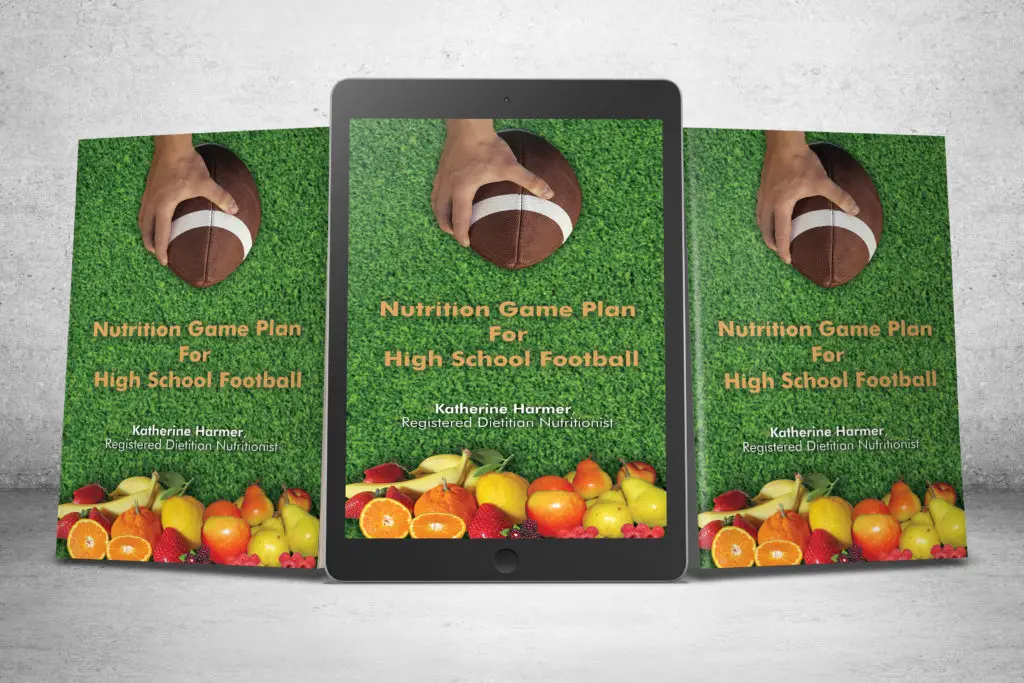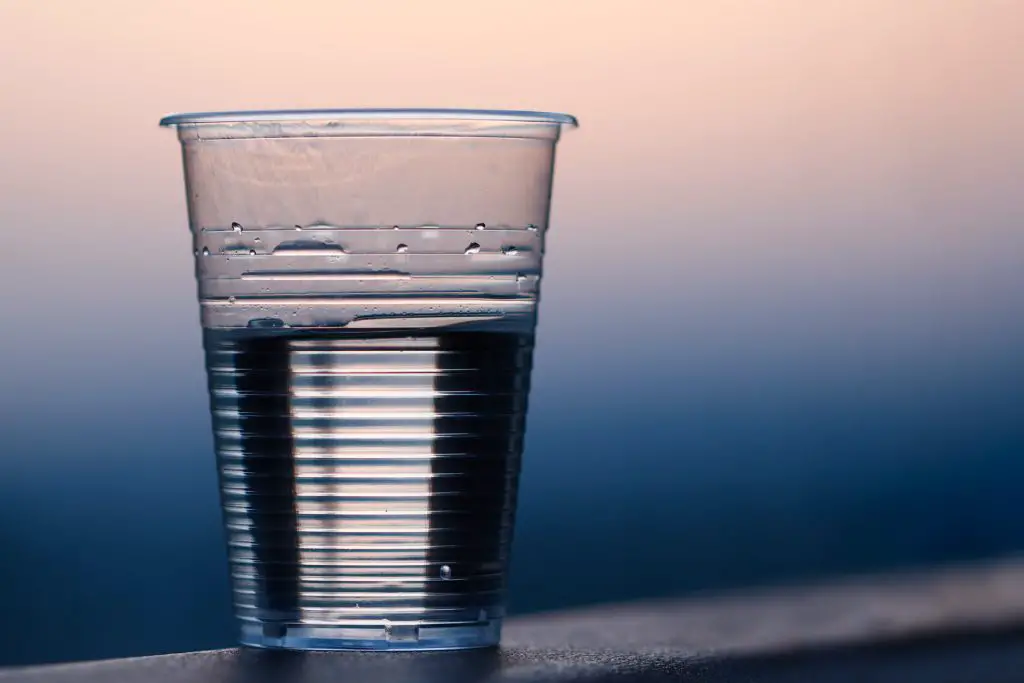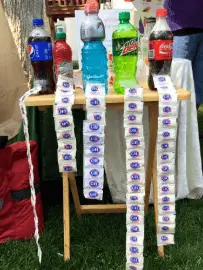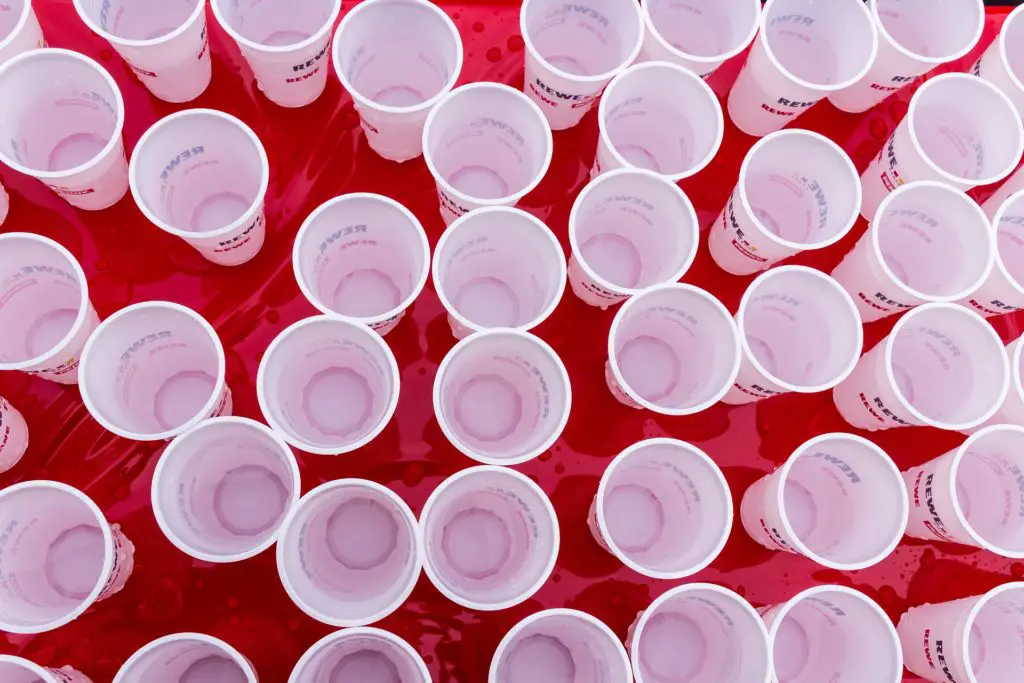NFL players often fuel up on Gatorade during game day. Is Gatorade beneficial for high school football athletes? If so, when and why should they drink it? What is the best sports drink? Learn when sports drinks are appropriate, and when athletes should stick with water, plus more details below.
SHOULD Football Players Drink Gatorade?
Do professional football players drink gatorade?
It’s true, football players often rely on Gatorade as a sports drink to energize their bodies for a long-duration practice or game. Many professional players turn to Gatorade as their beverage of choice for fueling and re-fueling a training session or game. Gatorade is also the official drink of the NFL, that’s why you always see it on the sidelines.
Also check out my post: Should Football Players Drink Alcohol?
Many professional players in the NFL can justify drinking Gatorade during practice or a game- they probably need it to provide energy and refuel their muscles.
However, as a high school football athlete do you need Gatorade?
The answer is yes, and no. If you are working out for an hour or more in a hot and humid climate, then you will need to stay hydrated and energized with a sports drink. Water is typically the best choice for hydration with exercise lasting an hour or less. Choose a sports drink if you are exercising for more than that at a higher intensity.
This post discusses more details about why and when you might need a sports drink such as Gatorade during an intense practice, and some ideas for better options.
Looking for a little more help and guidance with football nutrition this season? I’ve got you covered!
Nutrition Game Plan for High School Football Ebook

All you need to know for a healthy football season! Including a 28-day meal plan, snack idea list, hydration recommendations, meal schedule, supplement use, tips for what, when, and how much to eat for football, plus more. Fuel up for your best football season yet and rise above the competition!
Click here for more information.
Why Do Athletes Need Sports Drinks?
You eat food throughout the day in order to get energy and nutrients for your body to function properly. Your body can store many nutrients for later use, including carbohydrates which is your muscle’s number one fuel source. You get carbohydrates from sugars– either natural sugars such as fruit, grains, dairy, or from added sugars in treats, desserts, snack foods, and beverages.
During exercise, your muscles get extra energy from the storage form of carbohydrates to give you fuel to perform at your max potential. However, with more vigorous training, more sweating, and longer periods of time, this energy source is running low and you will soon start to feel fatigued. During these situations, your performance will decrease if hydration and energy are not replenished.
You could eat a quick snack, but what if you don’t like exercising on a full stomach? Plus, you don’t have a long break to take the time to eat something. So what do you do? What’s the answer for a quick fuel source that is easy to prepare, fast to consume, and doesn’t upset your digestive system?
Welcome sports drinks. Sports drinks such as Gatorade, Powerade, and many others were originally created to be this quick fuel source in the middle of intense physical activity and endurance events for athletes. The goal of sports drinks is to provide an appropriate amount of easily digestible carbohydrates to give you that quick energy, replace electrolytes lost in sweat, and also provide fluid for hydration to fuel you for long-duration physical activity.

Why Do Athletes Drink Gatorade Instead of Water?
Want to play like the pros and be like the pros? Do you know if your favorite NFL players drink Gatorade? Many of them do.
Gatorade has been the official sports drink of the NFL since the 80’s. NFL teams have contracts with Gatorade, which explains why you always see so many Gatorade coolers, bottles, and cups on the sidelines of professional football games. Locker rooms and sidelines are stocked with Gatorade products to help NFL players remain hydrated and have a balance of nutrients.
Plus don’t forget an important role of Gatorade- the winning coach “Gatorade bath” as the highlight of many big football games.
Gatorade was created for serious athletes as a carbohydrate-electrolyte beverage to refuel important key nutrients. This only applies if the athletes have worked out hard enough and long enough to deplete their body’s stores of carbohydrates for energy and other electrolytes for fluid balance.
Sports drinks are created with a specific concentration of carbohydrates (8%) to provide a balance and an easily-digestible and ready-to-use energy source during physical activity that won’t delay fluid absorption or cause an upset stomach. Many sports drinks also contain the electrolytes sodium and potassium, and sometimes calcium and magnesium.
The added electrolytes in Gatorade are helpful as well. Gatorade only contains sodium and potassium to replenish nutrient loss during exercise and from sweat. The purpose of electrolytes is to help your body regulate fluid balance.
Is Gatorade Good For You?
Gatorade was created to replenish, rehydrate, and refuel. But Gatorade has so much sugar, so is it actually beneficial for NFL athletes? What about high school football athletes, should they be drinking Gatorade?
The purpose of Gatorade is to provide carbohydrates, electrolytes, and hydration after prolonged, vigorous activity, especially in the heat. Gatorade definitely can benefit NFL players during high-intensity training camps in the heat. The high amount of sugar in Gatorade is meant to give the quickest fuel source for working muscles.
Unfortunately, Gatorade is enjoyed way more often than its intended use. Even though it was created as a sports drink, many young kids are drinking Gatorade after a light soccer practice, bringing it with their lunch at school, sipping it as an after-school treat, enjoying it as a snack throughout the day, etc.
Even though Gatorade has less sugar than soda, Gatorade has way too much sugar to be drinking it daily. It typically has a whopping 53 grams of sugar per 32 fluid ounce bottle- that’s 13 teaspoons of sugar and the daily recommendations for added sugars is less than 6 teaspoons (women) and 9 teaspoons (men) per day according to the American Heart Association. Woah- Gatorade has way too much sugar for us to be drinking regularly.
The sugar in Gatorade can be a helpful quick-fuel source for hard-working athletes. However, most people who drink Gatorade and other sports drinks, are not drinking them during practice to refuel.
If you drink Gatorade and you don’t need it, you are just adding a whole lot of unnecessary sugar to your body. Your body will store the amount that it can (the storage form of carbohydrates is limited) and then it turns the rest into excess body fat which means weight gain.
Gatorade is likely contributing to the obesity epidemic because too many people are consuming sugary drinks instead of water. Gatorade should not be the treated the same as water and juice, it is beneficial only for serious athletes.

What about Sugar-Free Gatorade? Is it Healthy?
Gatorade is made either using high-fructose corn syrup, corn syrup, or dextrose. But recently there has been some excitement about the Gatorade Zeros, meaning zero calories (basically zero- there’s 5 calories per bottle) or sugar.
There are sugar-free and calorie-free versions of Gatorade with artificial sweeteners (Acesulfame Potassium and Sucralose/Splenda). Why would you want Gatorade without sugar? The sugar is the quick energy source that your body needs for continued performance at your top potential.
Gatorade Zero could be a better choice for when you don’t need the carbs, but you want to replenish electrolytes.
My thoughts on artificial sweeteners: For now artificial sweeteners are generally recognized as safe (GRAS) and approved by the FDA and other world health organizations, but long-term effects are still being studied.
While research is not yet conclusive as to safety and long-term use of artificial sweeteners, it doesn’t seem like the benefits outweigh possible negative consequences. Current research is inconclusive, but negative effects are likely, especially long-term.
Technically artificial sweeteners are recognized as safe to use, and so I occasionally recommend their use, but I wouldn’t be surprised if my recommendation changes in the near future.
When Should You Drink Gatorade?
There are 3 reasons why athletes would need to drink Gatorade during physical activity, to:
1. Replace carbohydrates
2. Replenish electrolytes sodium and potassium
3. Rehydrate
Now remember, sports drinks, like Gatorade, can occasionally be appropriate, depending on the length and intensity of your workout. Gatorade is likely beneficial for athletes during prolonged vigorous physical activity, for MORE than 1 hour, especially in the heat (making you sweat more).
Typically your body has plenty of stored energy for physical activity less than 1 hour, but when you are working hard during intense activity you are running out of stored fuel (carbohydrates), you do need to replace some carbohydrates during exercise in order to continue to compete or train at your highest potential.
Should You Drink Gatorade During a Football Game?
High school football games typically last 2-3 hours, but playing time is only 48 minutes with 4 quarters at 12 minutes each. It doesn’t quite meet the criteria for needing a sports drink, but since the physical activity is extended over a few hours it may still be helpful to sip on a sports drink during a football game to refuel and keep your carbohydrate stores full.
“At the highest end of sport or competition, while it may not help, it certainly won’t hurt to sip on a sports drink during competition to ensure maximal hydration and energy supply.” –Christine Rosenbloom, PhD, RDN, CSSD, sports dietitian for Georgia State University.
Should You Drink Gatorade During Football Practice/Training?
If your workout is longer than 1 hour and is intense enough, you should consider drinking something with a moderate amount of carbohydrates to maintain your energy levels in order to keep you at your top performance throughout your training session. Gatorade is an easy and popular choice.
Think that your kid works out hard enough to deserve Gatorade? Think again. Most likely they don’t. It would need to be very vigorous activity for MORE than 60-90 minutes.
Ask yourself these questions to find out if you (or your athlete) need Gatorade:
Is your workout longer than an hour?
Is it vigorous? Are you sweating? Are you getting a REALLY good workout?
If you answered YES to these questions, then it is likely okay to drink Gatorade. But don’t overdo it- just have a moderate, normal amount.
“If you are working out for more than an hour in a hot, humid climate, be sure to stay hydrated with 3 to 8 ounces of a sports drink every 15 to 20 minutes.” Quoted from Christine Rosenbloom, PhD, RDN, CSSD, sports dietitian for Georgia State University.
What are Good Sports Drinks Options besides Gatorade?
Even though Gatorade can be helpful for a sports drink during a long practice or intense game, it isn’t necessarily the best option.
Sports drinks are occasionally appropriate when you need to replenish your energy for continued maximum performance during a workout or game. You’ll want a low amount of carbohydrate (sugar) content in your sports drink, otherwise it will negatively affect your body’s fluid absorption rate.
So choose either a sports drink with about 8% carbohydrates, or drink some watered-down juice. Gatorade or Powerade are good options. Some people also choose other beverages such as coconut water or pickle juice (see below in Related Questions).
You can also make your own sports drink with a little bit of fruit juice (lemon, pomegranate, orange, and/or coconut), salt, and a lot of water. You should get electrolytes from other natural sources that do not contain dyes and added sugars or artificial sweeteners.
Don’t test out a new sports drink or other beverage on a game day. Give it a trial run during practice well in advance to see what works best for you. That way, when game day comes you’ll be ready and energized.
There are other great ways to replenish carbohydrates and electrolytes besides sports drinks– try fruits and vegetables. Bring orange or apples slices, or even watermelon or grapes to practice for a hydrating and refueling snack. Most people don’t like working out on a full stomach, but grabbing some fruit at half time may be helpful.

How much Water/Liquid Do You Need During Football Practice?
Remember the sports drink is for during your training session. You don’t want to be drinking Gatorade, Powerade, or other energy and sports drinks before a training session or game. Hydrate with regular water plus balanced meals/snacks. Bring lots of water to practice and drink regularly.
The general recommendations is that you want to drink about 2 cups of water for every pound of weight you lost during activity (from sweat and other water losses etc.). But most people don’t weigh themselves before and after an exercise, so let’s look at recommendations that are a little easier to remember.
Water Recommendations for Football Practices and Games:
- Stay hydrated during the day.
- 1-2 hours before exercising drink 15-20 ounces of water.
- Drink 8 ounces before your workout and 8 ounces about every 15 minutes of intense workout.
- Hydrate after your workout.
That being said- water recommendations are different for everyone depending on many factors (i.e. some people sweat more, some days are hotter).
Learn to hydrate and listen to your body and follow your thirst cues. Don’t go from drinking no water to tons of water during a game, you won’t be used to all of that water sloshing around in your stomach. Work up to an optimal water intake during practices until you figure out what amount works best for you, while keeping yourself well hydrated.
If you choose to drink only Gatorade for hydration during your 2-3 hour football practice/game, then you’d be drinking at least 120 ounces of Gatorade. That’s 200 grams of sugar and 800 calories. That’s a lot of sugar. You do need some carbohydrates, about 30-45 grams per hour of intense exercise, but try getting some of it from Gatorade, some of it from fruit, and hydrating with lots of water.
Check out my post on fruit and athletes: Best Fruits for Teen Athletes
Related Questions:
Is coconut water a good sports drink? Coconut water can also be a helpful sports drink for refueling workouts, however it is also known to cause upset stomachs, depending on the individual. It also doesn’t have as much sodium as sports drinks, and may not be the best choice for longer, intense workouts.
Is pickle juice a good sports drink? Some college teams and NFL athletes are also turning to pickle juice instead of sports drinks. Pickle juice can be a good alternative, it that’s your thing.
Are energy drinks healthy for teenage football athletes? Energy drinks are typically full of caffeine, sugar, and contain other ingredients that are harmful to children and teens. Energy drinks are not recommended.
Summary
- Professional football players often drink Gatorade.
- Sports drinks, like Gatorade are beneficial for athletes during prolonged vigorous physical activity, for MORE than 1 hour, especially in the heat.
- Sports drinks are important to help athletes refuel with carbohydrates, electrolytes, and water.
- Stay hydrated before, during, and after intense exercise. Drink 8 ounces of fluid every 15-20 minutes.
- Gatorade has a lot of sugar. Try making your own sports drink, or hydrate with water plus eat some fruit.
Enjoyed these tips and looking for more high school football nutrition recommendations? You can find all my football recommendations in one place in my new ebook- Nutrition Game Plan for High School Football. Check it out!
Related Football Nutrition Posts:
- FREE Meal Plan for High School Football Athletes
- Is Whey Protein Safe for Teenage Athletes?
- How Many Calories Does a High School Football Player Need?
- How To Get to Your Goal Football Weight- for Highschoolers
- The Worst Foods to Eat Before Football
- Should You Eat Before Football?
By Katherine Harmer, Registered Dietitian Nutritionist
References:
Academy of Nutrition and Dietetics. “3 Easy Tips for Fueling Your Workout without Overdoing It”. By Christine Rosenbloom, PhD, RDN, CSSD. Published June 19, 2019
Fueling Teens is a participant in the Amazon Services LLC Associates Program, an affiliate advertising program designed to provide a means for sites to earn advertising fees by advertising and linking to Amazon.com. We also participate in other affiliate programs which compensate us for referring traffic.

